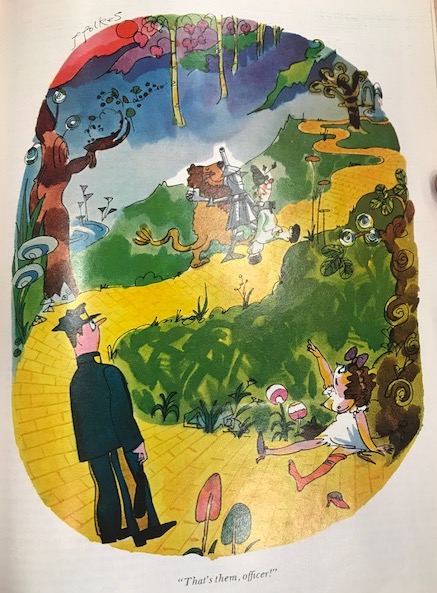
Patricia Lockwood on the rape joke
When Patricia Lockwood wrote a poem titled 'Rape Joke,' she had no idea it would start a global conversation. Warning: Distressing Themes.
Posted by Channel 4 News on Friday, April 28, 2017
With the advent of the Me Too movement, rape culture has been further pushed into public consciousness. Rape and the idea of rape have always been closely associated with women. Susan Griffin calls the act a “form of mass terrorism” that is used to “keep women passive and modest” (Griffin, 100).
The comic above is from Playboy (vol. 25, no. 3) published in 1978. It depicts Dorothy from The Wizard of Oz speaking to a police officer after being sexually assaulted by other characters from the book. The humor is supposed to come from the fact that a story from many people’s childhoods is being retold as an incident of rape. This may even be commenting on the original story in how it is dangerous for a young woman to travel with male strangers. The policeman in this comic is seemingly baffled and stunned by this event and he serves as a type of audience surrogate. Comedy may come from the sheer strangeness of this incident. However, this may also unintentionally reflect the history of the American legal system neglecting cases of sexual assault. An example of this would be the high percentage (15 percent) of rape complaints deemed “unfounded” in 1973. Police have the ability to identify a claim as “founded or “unfounded” and this is what determines the necessity for a subsequent investigation. This may be due to police skepticism of a claim but it can also result from complaints being outside jurisdiction and other bureaucratic formalities (Estrich, 16).
Patricia Lockwood’s poem “Rape Joke” satirizes works like these by repeating over and over the phrase rape joke. The opening lines of the poem, “The rape joke is that you were 19 years old. / The rape joke is that he was your boyfriend” (Lockwood) are perhaps a commentary on how cases involving a prior relationship is taken less seriously in court. This is due to these cases being seen as more “private” and not “the business of public prosecution” (Estrich, 24).
This repetition within the poem questions rhetorically how sexual assault can be funny. Similar to the cartoon, there is a somewhat casual and humorous tone used in the poem in how it references pop culture: “Like the dude was completely in love with The Rock” (Lockwood). However, here it is used to make the reader uncomfortable in how the rapist is humanized with a quirk many people may share. By making the act personal the poem reframes all rape jokes, including the cartoon. It forces the reader to empathize with the victim and then asks if the rape was funny. As a result, when looking back at the cartoon, the viewer is pushed to consider the personal trauma the cartoon’s Dorothy may have experienced and this erases all of the humor within the work.
Sources:
Susan Griffin, The American Women’s Movement 1945-2000, edited by Nancy MacLean, Bedford/St. Martin’s, 2009
Playboy, vol. 25, no. 3, 1978.
Lockwood, Patricia. “‘Rape Joke.’” The Awl, 25 July 2013, www.theawl.com/2013/07/patricia-lockwood-rape-joke/. Accessed 11 Dec. 2018.
Estrich, Susan. Real Rape. Harvard University Press, 1987.
